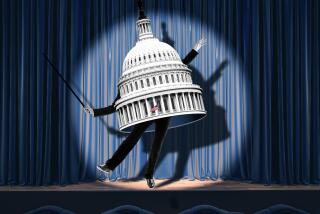Cattle Are Bargaining Chip for the NEA : Grants: “I shall return,” says Sen. Helms, following the vote that killed his amendment, along with a measure to double ranchers’ grazing costs.
- Share via
Thanks to the convoluted ways of American politics, both proponents of unfettered artistic expression and millions of American cows can rest a little easier tonight.
The National Endowment for the Arts, which had sought a $174-million budget to continue making grants to artists next year, got its money on a 73-25 vote of the U.S. Senate Thursday. But the only way the Endowment’s Capitol Hill supporters could swing the necessary Senate votes to approve the budget without an anti-obscenity rider authored by Sen. Jesse Helms (R-N.C.) was to tie it to a plan to limit the cost of grazing rights on federal land.
“Battles for free expression always have a difficult time in Congress,” Milan Verveer, a spokesman for People for the American Way, said Friday. “Regrettably, in this year of the 200th anniversary of the Bill of Rights, that remains a fact.”
People for the American Way, the American Civil Liberties Union and the National Campaign for Freedom of Expression have regularly opposed Helms’ attempts to impose indecency restrictions on federal funding of the arts. Predictably, all three organizations lauded the defeat of the Helms amendment.
For his part, Helms promised only that the issue is not dead.
“I shall return,” he concluded in an impromptu speech to reporters outside the Senate chambers following the vote. His office had no further comment Friday.
In language lifted almost verbatim from a Helms amendment passed three years ago to ban “patently offensive” speech from radio and television, the North Carolina conservative attempted to forbid NEA grant-making to any applicant whose work showed offensive depictions of sexual or excretory functions on stage, in publications or on gallery walls.
In a speech against the Helms amendment, Sen. Tim Wirth (D-Colo.) brought in dozens of reproductions of classic paintings, from Titian to Toulouse-Latrec, all of which he said would have been forbidden under a strict reading of Helms’ “patently offensive” restriction. Wirth attacked the amendment further by pointing out that it would ban depiction of sexual or excretory organs and that, medically, the human skin is defined as an organ that excretes sweat.
Helms’ indecency ban for radio and TV was struck down by a federal court earlier this year as unconstitutional.
Even so, the proposed Helms indecency ban on NEA artists appeared as though it would garner 2-to-1 support from the same lawmakers who supported Helms’ broadcast measure in 1988.
Finally, it was cheap beef that steered the Senate back to a re-examination of First Amendment rights.
In the remarkably odd way in which things often get done in the nation’s capital, Rep. Sidney Yates (D-Ill.) offered to kill a House measure to double ranchers’ grazing costs if the Senate dropped the Helms amendment. With that compromise, an artist’s right to free expression became inextricably meshed with a cow’s right to chew grass for no more than $1.97 per steer per month.
Republican senators from 16 Western states, where ranchers use 268 million acres of federal land to pasture cattle and sheep, switched their votes against Helms.
“I’ve been defeated before . . . but this is the first time an amendment I have offered has been defeated by a bunch of bull,” Helms said, calling his measure the victim of “back-room deals and parliamentary flimflam.”
Los Angeles performance artist John Fleck, one of four NEA grant applicants who were rejected and later sued the endowment on grounds that its director, John Frohnmeyer, discriminated against them, said he would celebrate the defeat of the Helms amendment by re-applying for a grant.
“Yahoo! I’m getting out my NEA grant application and blowing off the dust,” said Fleck, who maintains that the NEA rejected his 1990 request for $5,000 because he urinated on stage during one of his performance pieces.
Fleck and the three other performance artists who comprise the so-called “NEA Four” brought suit in Los Angeles federal court against the NEA, charging violation of their First Amendment rights.
Fleck said that he will incorporate a tribute to Helms into his act shortly after the first of the year. The performance will not be federally funded, he said.
Verveer, however, cautioned against euphoria.
“Jesse has cast himself as the leader in the right’s movement to save America from cultural decline and immorality,” he said, predicting that a similar amendment would be attached to some bill during the 1992 legislative session.
On Friday, Helms was reportedly sending out manila envelopes to fellow Republican lawmakers, containing a copy of Performance Journal Three, a New York-based quarterly magazine with explicit photos of sex acts and organs in it. The NEA recently sued Movement Inc., which published the magazine, for recovery of $1,400 in NEA grant money that Movement allegedly used to publish the magazine.
More to Read
The biggest entertainment stories
Get our big stories about Hollywood, film, television, music, arts, culture and more right in your inbox as soon as they publish.
You may occasionally receive promotional content from the Los Angeles Times.










